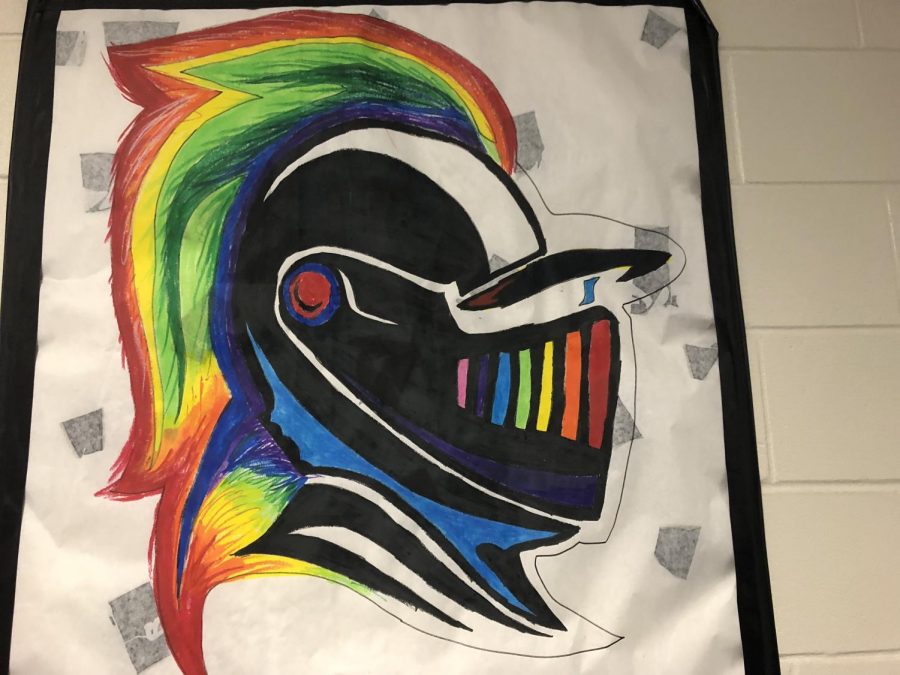Support from the Sidelines: What it means to be a good ally
Throughout the years, LHS student artists have drawn Lancers using various artistic themes.
Why do we need allies?
According to society, the role of an ally is to sit passively alongside a struggle and take pride in the fact that they are not actively contributing to the problem. However, there are students that face the effects of prejudice and bigotry every single day that need support from their peers more than ever.
The state of allies in LHS has much room for improvement, and students need to be more supportive of their peers before demanding a gold star for their meager contributions. Junior Adrienne Lafond, member of the executive board of the LHS Gay-Straight Alliance (GSA), explains that while the staff and administration have proven to be understanding of minorities such as LHS’s LGBTQ+ community, students who look for support from their peers are often left hanging.
“Student-wise, I feel like we lack [support]. I’m sure they’re maybe not as open to being supportive, or along those lines,” Lafond said. “I know a good handful of kids that are allies, and most of it is because they have friends that have come to meetings.”
Some people or groups, like Londonderry’s LGBTQ+ community, depend on allies more than others. Regardless, becoming an ally and possessing the qualities of a valuable ally is something that people should strive towards, both at LHS and in the world. This includes showing support for communities such as the LGBTQ+ community, people of all races and religions, and those living with mental or physical disabilities.
When it comes to entire communities of people, being a good ally is important in encouraging the mentality that diversity in everything from an immediate community to the world is worth defending.
The impact of allies on a school or community is incredibly prevalent and appreciated, and those who desire support from their peers are grateful for it.
“It just creates an overall better place to be. When you’re supportive of each other, it sends out more positive messages, and those positive messages send out a big wave,” Lafond said. “It’s definitely a ripple effect, which I love to see.”
How do you know if you’re being a good ally?
When determining if you’re a good ally, ask yourself certain questions and do some personal reflection. What does being an ally mean to you? How have you handled situations where someone may have needed an ally in the past? And what can you do to be a good ally from this point forward?
For example, let’s assume you hear a racist or homophobic slur casually thrown around in a conversation in the hallway. Instead of confronting the person on what they said, you keep your head down and tell yourself that as long as you don’t think or say things like that, you are not part of the problem. However, being a passive bystander is giving people a free pass to say what they want, even if they don’t realize that what they’re saying could be hurting or offending their peers on a personal level.
You’re not going to be barred from ever calling yourself an ally if there has been an instance where you chose not to react to things a certain way in the past, but when it comes down to it, being an ally is about what you can change about the present to have a positive impact on the future.
So now you may be asking yourself where you stand, or you could be proudly preaching that you know where you stand and you know what does and does not apply to you. Despite this, the changing world and change in current events means that being an ally can and will entail different things in the future.
What should a good ally do?
The job of allies is not to constantly keep people in line in a specific mindset for an extended period of time, but to grow with different communities and consistently educate themselves and others as time goes on. This means keeping up with current events and being willing to have conversations with those who do not understand or support your cause.
Patience and a willingness to educate people is something that anyone may need time to perfect as an ally, since differing sides can clash and debating can be frustrating and tiring. People have differing opinions when it comes to things such as the Black Lives Matter movement or LGBTQ+ topics.
The idea isn’t to completely degrade other people’s opinions and tell them that they’re wrong for feeling a certain way, because that doesn’t represent the ally or their community well at all. Instead, it comes off as a social justice warrior approach to what could just be a levelheaded conversation.
The world has different expectations for how people should act and think, and when these expectations cause harm at the expense of minorities, the truth is that the most acknowledged voices are not the ones in danger, but rather those who see injustice and refuse to sit on the sidelines.
The definition of an ally can not be pinned to a certain set and sequence of words, and no person is going to be the perfect ally for everyone, but everyone has the ability to recognize and strive to represent a more inclusive future.



